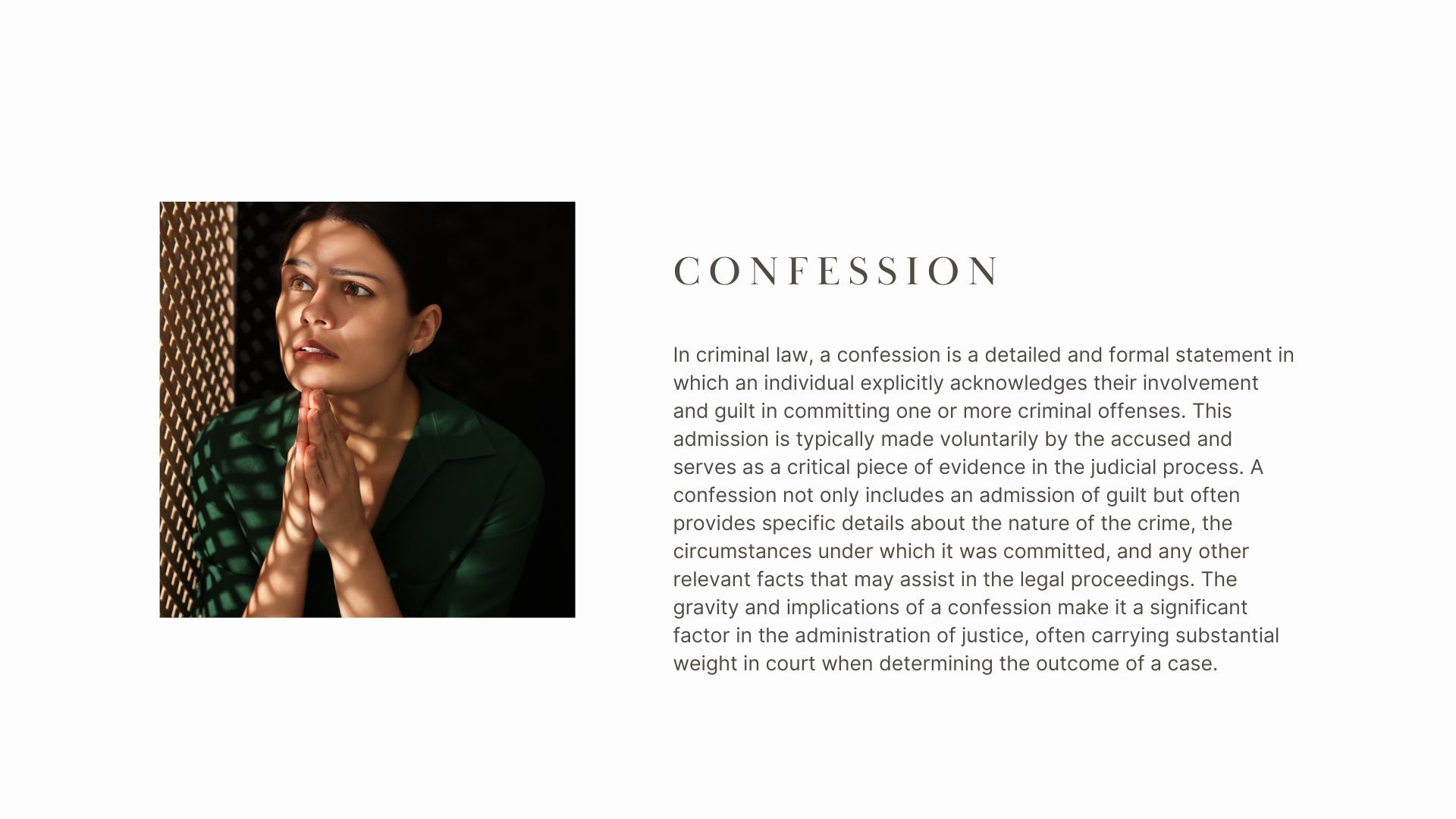Confession: A Complete Overview
What is Confession?
Confession in the legal context is a statement made by a person acknowledging that they have committed a crime. It is an admission of guilt that is typically made voluntarily by the accused to a law enforcement officer, magistrate, or in some cases, to a private individual.
A confession must be clear and unequivocal, explicitly acknowledging the guilt or involvement in a criminal act. The legal definition of confession, as outlined by various judicial interpretations, requires that the statement must be made by the accused themselves and should directly admit to the commission of the crime in question.
Types of Confession
The Indian Evidence Act, 1872 categorizes confessions into several types, each with specific legal implications and requirements:
- Judicial Confession: These are confessions made before a magistrate or in a court during judicial proceedings. They carry significant weight because they are made under conditions where the accused is expected to understand the legal implications of their statements.
Case Reference: In R. v. Palvinder Kaur [1952 SCR 63], the Supreme Court held that a judicial confession must be recorded in the manner prescribed by law, ensuring the accused is made aware of the implications of their confession.
- Extra-Judicial Confession: These are confessions made outside the court or judicial proceedings, to any person, including private individuals or law enforcement officers. Their admissibility and reliability are subject to stringent scrutiny due to the potential for coercion or misinterpretation.
Case Reference: In State of Punjab v. Bhajan Singh [1975 AIR 258], the Supreme Court emphasized that extra-judicial confessions must be corroborated by strong, independent evidence due to the inherent risk of unreliability.
- Retracted Confession: These are confessions that the accused initially makes but later withdraws or denies. The evidentiary value of retracted confessions depends on the corroborative evidence available to support the initial confession.
Case Reference: In Pakala Narayana Swami v. Emperor [1939 AIR 47], the Privy Council held that a retracted confession could be acted upon if it is corroborated by other independent evidence.
- Confession to Police Officer: Under Section 25 of the Indian Evidence Act, confessions made to a police officer are not admissible in court to prevent the use of force or coercion by the police.
Case Reference: In Nandini Satpathy v. P.L. Dani [1978 SCR (3) 608], the Supreme Court highlighted the importance of protecting the accused from self-incrimination and the potential for coercion in police custody.
- Confession in Police Custody: According to Section 26 of the Indian Evidence Act, a confession made by a person while in the custody of the police is not admissible unless it is made in the immediate presence of a Magistrate.
Case Reference: In Bachan Singh v. State of Punjab [1980 AIR 898], the Supreme Court reiterated that confessions made to police officers or while in police custody are not admissible unless made in the presence of a magistrate.
- Dying Declaration: Though not strictly a confession, a dying declaration can be considered an admission of guilt in certain circumstances. It is a statement made by a person on the verge of death, regarding the cause or circumstances of their impending death.
Case Reference: In Queen Empress v. Abdullah [1885 ILR 7 All 385], it was established that a dying declaration holds significant evidentiary value and can be admitted in court if made with a sense of impending death.
Evidentiary Value of Confession
The evidentiary value of a confession depends on several factors:
- Voluntariness: A confession must be made voluntarily, without any coercion, duress, or inducement. Courts scrutinize the circumstances under which a confession was made to ensure it was not obtained through improper means.
Case Reference: In Shivappa v. State of Karnataka [1995 SCC (Cr) 568], the Supreme Court held that the confession must be free from any influence or pressure for it to be admissible.
- Corroboration: Confessions, particularly extra-judicial and retracted ones, often require corroboration by independent evidence to establish their credibility and reliability.
Case Reference: In Haricharan Kurmi v. State of Bihar [1964 SCR (7) 623], the Supreme Court ruled that a confession must be corroborated by other evidence to be admissible.
- Presence of Magistrate: Confessions made in the presence of a magistrate are given higher evidentiary value due to the reduced likelihood of coercion and the procedural safeguards in place.
Case Reference: In State of Maharashtra v. Damu Gopinath Shinde [2000 (2) SCC 677], the court emphasized the importance of magistrate presence in ensuring the voluntariness of a confession.
- Consistency: Consistency in the details provided in the confession and its alignment with other facts and evidence in the case enhances its evidentiary value.
Case Reference: In Ram Singh v. Sonia & Ors. [2007 (3) SCR 94], the court considered the consistency of the confession with other evidence as a crucial factor in determining its admissibility.
When and To Whom Confession Can Be Given
- To a Magistrate: Judicial confessions are preferably made to a magistrate, as they provide a controlled environment where the accused is aware of the legal implications of their statements.
Case Reference: In Joginder Kumar v. State of Uttar Pradesh [1994 AIR 1349], the Supreme Court highlighted the role of the magistrate in ensuring the voluntariness of the confession.
- During Judicial Proceedings: Confessions made during trial or other judicial proceedings are directly recorded and form part of the official court record.
Case Reference: In Bharat v. State of Uttar Pradesh [1971 AIR 808], the Supreme Court discussed the importance of confessions made during judicial proceedings.
- To Private Individuals: Extra-judicial confessions can be made to anyone, including friends, relatives, or acquaintances. However, their admissibility depends on the circumstances and corroborative evidence.
Case Reference: In Rangappa Hanumappa v. State of Karnataka [AIR 2009 SC 1947], the court considered the admissibility of extra-judicial confessions based on corroborative evidence.
- To Police Officers: Confessions made to police officers are generally inadmissible unless certain conditions, such as the presence of a magistrate, are met.
Case Reference: In Khatri v. State of Bihar [1981 SCR (2) 408], the Supreme Court discussed the inadmissibility of confessions made to police officers under Section 25 of the Indian Evidence Act.
Conclusion
Confession, as a crucial piece of evidence in criminal law, requires careful scrutiny to ensure its voluntariness, consistency, and corroboration. The types and circumstances under which confessions are made significantly affect their admissibility and evidentiary value. Judicial precedents emphasize the importance of safeguarding the rights of the accused while ensuring that confessions are reliable and contribute to the pursuit of justice.

